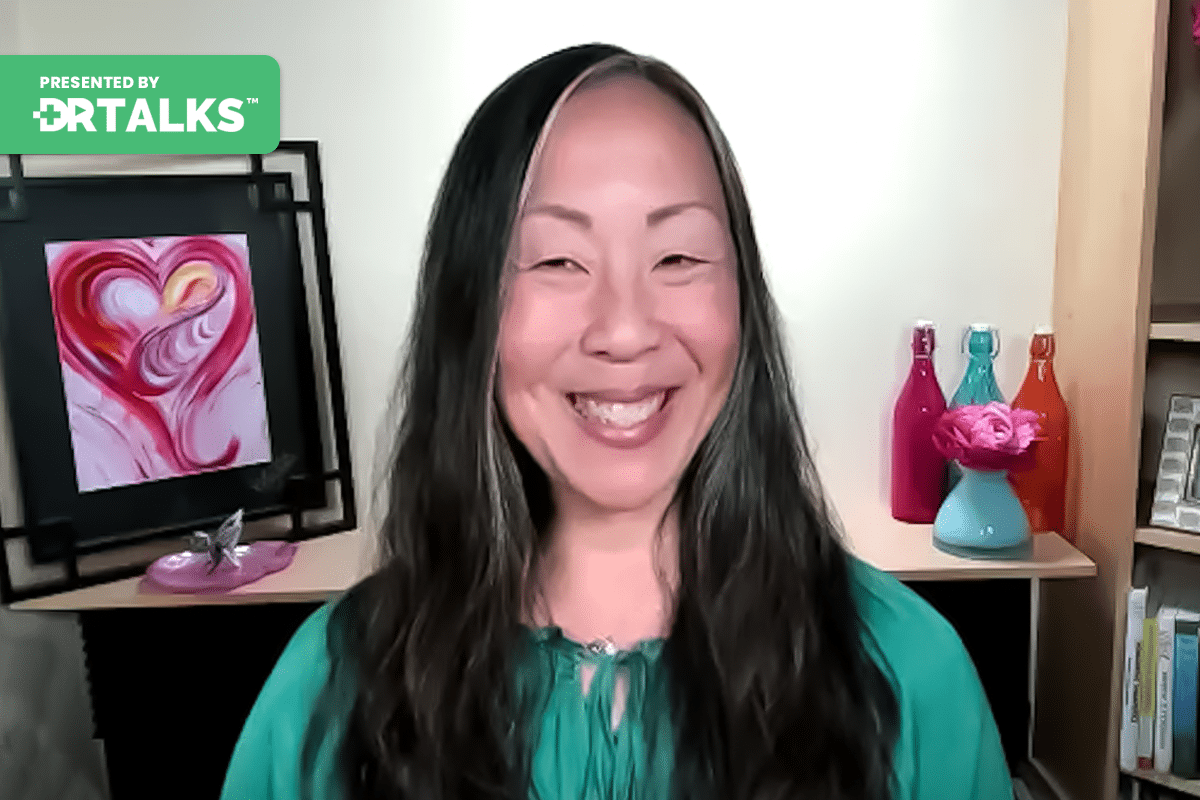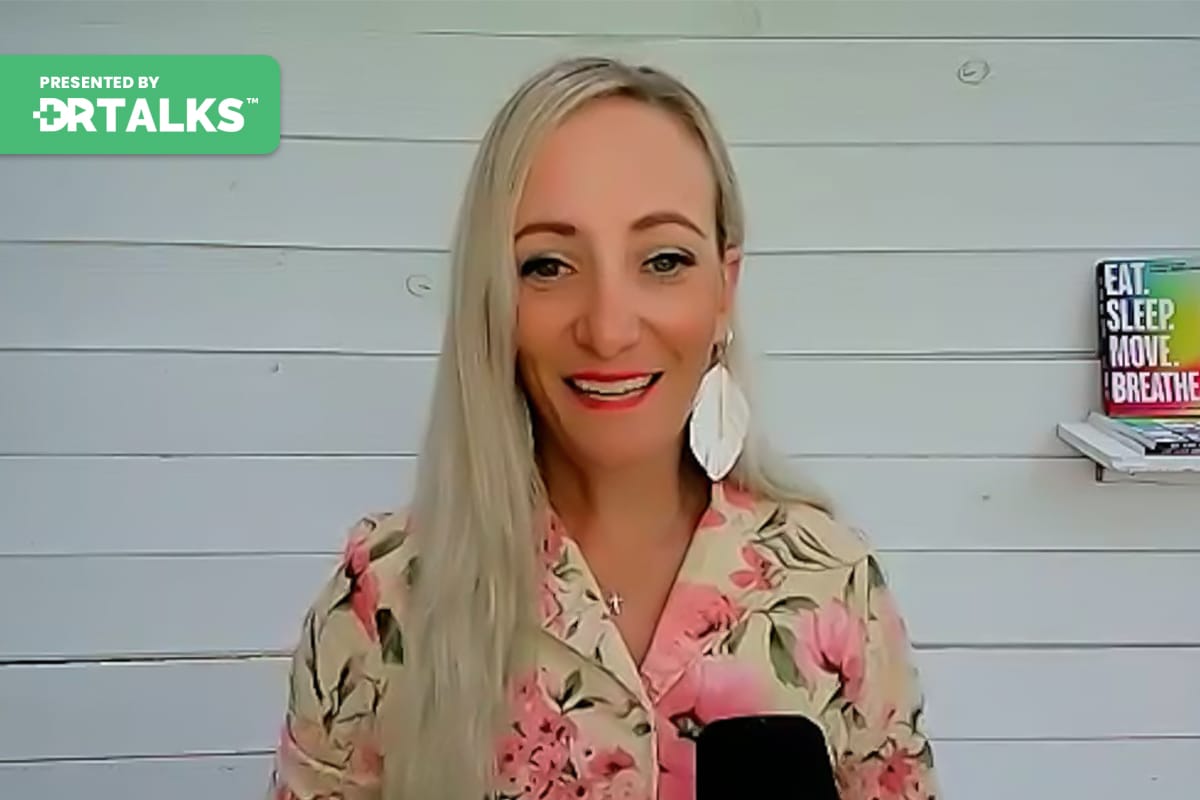Join the discussion below

Dr. Jenny Pfleghaar is a double board certified physician in Emergency Medicine and Integrative Medicine. She graduated from Lake Erie College of Osteopathic Medicine. She is the author of Eat. Sleep. Move. Breath. A Beginner's Guide to Living A Healthy Lifestyle. Dr. Jen is a board member for the Invisible... Read More

Tracy Tranchitella is a Doctor of Naturopathic Medicine integrating the scientific principles of Functional Medicine with the sensibility and holistic view of traditional naturopathy. She provides naturopathic consultations for general health issues including digestive disorders, blood sugar management, autoimmune disorders, cardiovascular disease and metabolic disorders, chronic fatigue, hormone and menstrual... Read More
- Understand the effects of COVID on the adrenal glands and the HPA axis, and how these relate to long COVID
- Learn about the symptoms of HPA axis dysfunction, including autonomic nervous system dysfunction, orthostatic intolerance, fatigue, dizziness, and blood pressure issues
- Discover the strategies to address HPA axis and adrenal dysfunction in the treatment of long COVID
Related Topics
Ace2 Receptors, Acute Infection, Adrenal Glands, Autoimmunity, Chronic Illness, Cortisol, COVID, Hormone Health, Hpa Axis, Hydrocortisone, Long Covid, StressJen Pfleghaar, DO, FACEP
Hello. It’s Dr. Jen. Welcome back to the summit. I’m very excited for the topic today. I think it is so important. We’re going to be talking about adrenal health and long-covid with Dr. Tracy Tranchitella Taylor and she is a doctor of naturopathic medicine. She’s been in practice for 24 years and graduated from the Southwest College of Natural Medicine. She now has a practice out in Bend, Oregon. So, so excited for her to share her expertize about this because this is a newer topic and as we know, adrenals and thyroid go hand in hand. So Dr. Tranchitella, can you please tell us a little bit about yourself and why you got into medicine? In functional medicine and naturopathy medicine in the first place?
Tracy Tranchitella, ND
Well, I’ve always been interested in health and nutrition. I mean, I started reading books on nutrition and health when I was like in my teens. And so initially when I went to college, I really wanted to get a degree in nutrition. But at the time that was probably back in the early eighties. I was told that my nutritional degree would allow me to work in a hospital setting, you know, kind of like a dietetics role or work for the airlines, you know, constructing food menus and stuff like that was just that did not appeal to me at all. So I changed course and I went into education. I was certified as a K through eight elementary school teacher. And, you know, so in a sense, a lot of what I do as a naturopath is education.
So, you know, that degree certainly helped me in terms of presenting information and educating my patients, but I still maintained my interest in health and nutrition. And it wasn’t until I went to a lecture given by a naturopath when my husband and partner was back in medical school and she gave a great lecture and she was just talking about naturopathic medicine in general. And so I grabbed a brochure on the back table and I read about genetic medicine and all of the things that we would learn and what we could do with that degree. And I’m like, Okay, this is it. I finally found it. And so I ended up going back to school. I went and had to do some prerequisites and ended up applying to Southwest College of Medicine and started there in like 1995. And at the time they had like a three year track. So we like condensed four years of medical education into three years. So it was pretty intense. I don’t think they offer that anymore. It was a lot, but I graduated in 1998 with my degree in naturopathic medicine and started practicing in San Diego, and we eventually moved up to Temecula. I was there for a while and then we moved up to Bend, Oregon, about ten years ago. And, you know, so my interest in health and nutrition really started with a family member who had some chronic illnesses. But she managed it through natural means. And she would tell me all about these little things, all of these little principles and things that she had learned. And as I was going through my naturopathic education, I realized that she was really adherent to the principles of naturopathic medicine. I don’t think she knew it, but that was really what she was preaching. And so it really felt like home to me. So naturopathic medicine is great in that regard. You know, we offer a lot, I think, all fields of medicine have something to offer. And naturopathic medicine, as it becomes more known, people start to look around and say, you know, I want to do some sort of integrative therapies or adjunctive natural therapies. What can I do with my diet and my lifestyle that will improve my health over time or response to a disease process? So I think it’s just a great form of medicine.
Jen Pfleghaar, DO, FACEP
Yes, it is. And so needed, especially we have found out during the pandemic that conventional medicine is not really that helpful, you know, especially for the post-COVID stuff. And I know you dove into that because yeah, we were just talking before the interview. I was talking about a patient that ran a little late today because he was suffering from a post vaccine injury and it turned in you know, and long COVID is similar to how they present and he had been suffering for two years and finally his back on his boat. So using these out of the box, you know, medicine, you know, it’s not really out of the box. It’s diet and nutrition. It’s some other unconventional, repurposed things. We can really get people better, which is amazing.
Tracy Tranchitella, ND
Yeah, well, I agree. And you know, when as we were talking about before we started, the whole idea of long COVID is really to me, it’s just it’s another, you know, like chronic fatigue, myalgic encephalomyelitis presentation that is just being triggered by a different virus. So it’s really prompting us to go back and look at chronic fatigue syndrome, fibromyalgia, all of these post-viral syndromes to say, okay, what are the underlying mechanisms physiologically that are occurring in that is presenting with the symptom picture of long COVID? And you know, for a lot of people, long COVID, one of the most debilitating effects is orthostatic intolerance, you know, or post exertional malaise.
Like they can’t really engage in a lot of activities, not just exercise, but regular activities of daily living are just exhausting because they have this orthostatic intolerance that doesn’t allow them to be on their feet and moving around very much. And so there’s all of these compensatory mechanisms that kick in that are definitely related to what goes on in the hypothalamus, pituitary adrenal axis, or for short the axis. And so these compensatory mechanisms are trying to compensate for these blood pressure, distribute violations. And it sets off, you know, an a rapid heart rate, this feeling of being overwhelmed or anxious and just the need to lie down to kind of stabilize your symptoms. So there’s so many things that go on that are familiar in terms of like a chronic fatigue syndrome, because the symptom picture for chronic fatigue and adrenal insufficiency are, you know, like side by side, identical almost. And certainly, you know, adrenal insufficiency is one of the main endocrinol, but these in long-covid. So we really have to take a look at that whole mechanism and what is going on in the stress response and where things aren’t occurring properly. Because I think it’s a big component of how people feel. So we really have to take a close look at it.
Jen Pfleghaar, DO, FACEP
Yes. And that’s not happening when people go. And I think that’s and I think it’s very important for long COVID patients to rule out cardiac things. And, you know, having go to pulmonology and I like all that. And then once all of that clears, you know, we can get to work. So how does COVID, you know, we know it’s also stars COVID to how does it actually specifically affect the adrenal glands?
Tracy Tranchitella, ND
Well, you know, during acute infection, you know, what we see and this can occur with other viruses, too, is that cortisol doesn’t respond as you would expect it to in an acute illness. You would expect it to go up because having an acute illness is a stressor. So you would expect to see cortisol go up, but it doesn’t go up. In fact, it starts to drop down. So people start to compensate in that way. And there is a condition and I’ve written this down because it’s an acronym C, I, R, C, I, which is critical illness induced corticosteroid insufficiency or critical illness related corticosteroid insufficiency. And this can happen during severe acute respiratory syndrome. It can also happen during sepsis and other really severe illnesses where you start to see cortisol drop off. And interestingly, you know, what we were talking about earlier is, you know, in some of the protocols put out by FLC, CC, Dr. Paul Merrick, as we know, he was a specialist in sepsis.
He was a world renowned expert. And his protocol for treating sepsis involved the use of vitamin C thiamin and hydrocortisone. And so we understand now why he would use hydrocortisone, because people are they’re not producing adequate cortisol to help support the immune response against the infection. So that’s one of the things that can happen, is you get a drop off of cortisol in the acute infection. And even during long COVID, you see that cortisol levels don’t return to where they should be. And then you have the component of there’s there’s amino acid structures within SARS-CoV-2 that are very similar to amino acid sequences in A to H adrenal cortical tropic hormone.
And so that’s released from the pituitary to stimulate the adrenals to produce cortisol. But because of those similarities in those amino acid sequences, we get molecular mimicry where the body produces antibodies against the virus, but it’s also producing antibodies against H and pretty much inactivating it, making it, you know, useless. So the body will continue to produce AZT. H And you will continue to produce antibodies against it. And all the while you have this low cortisol happening during the acute phase of the illness, but no way of really stimulating the adrenals to produce more cortisol. So, you know, as some of the literature states that really in treating acute Cogan we should give low dose hydrocortisone we should be giving this to patients understanding that this occurs during the acute phase of the illness. And so it would turn off the production of AC, T, H and also reduce antibodies formed against the t h so we have that component of molecular mimicry which, you know, leads to autoimmunity, where we’re producing antibodies against our own tissue. And then there’s also the component of the virus can directly infect different glands within the endocrine system. You know, we have ace2 receptors in the hypothalamus, the pituitary and in the adrenals. So the virus can get gain access to the cells of that tissue and replicate there. And, you know, there’s a lot of similarities between SARS-CoV-2 and SA’s one where they, you know, looking back in the literature where they’ve done some autopsy studies, they can see tissue changes and necrosis and actually isolate the virus within the adrenal glands. So there’s three mechanisms by which, you know, you can have an acute response to COVID, but also long term effects of that response that really lead to ongoing adrenal insufficiency.
Jen Pfleghaar, DO, FACEP
Yeah, one thing I’ve seen in lab work that has been really interesting is just really low DHEA levels in 30 year olds, 40, 50, and sometimes are replaced. Sometimes I don’t. Sometimes I’m like, let’s see if the body will recover. But it’s all post-COVID. I was not getting these low DHEA was before that. And DHEA is a hormone produced in the adrenal glands. It can move on down the hormone cascade who are androgens. And really, it’s it’s a really important little hormone and it naturally decreases as we age. But I just post-COVID I want to write, you know, a research article, a case study on this because I have so many patients that I’m like, you’re this this is so crazy. So we know that, you know, like you had said that there are two receptors on the adrenal glands and this is really causing problems. And I can see it in lab work. And obviously, I’m hearing their symptoms, too. So let’s talk about some of the symptoms related to that HPI access dysfunction post COVID infection.
Tracy Tranchitella, ND
So, you know, one of the main things obviously is fatigue, but it’s not just kind of a normal fatigue after a long day. It’s like unrelenting fatigue that is not better by getting a good night’s sleep. And then speaking of sleep, there may be some issues with insomnia because you’ve got dysregulation of the circadian rhythm output of cortisol, all of that stuff. You know, it’s is these are these regulatory mechanisms that kind of tips into the cycles of dark and light. And so everybody’s kind of off kilter when it comes to that.
So they may not be getting a good night’s sleep either. So that feeds into the fatigue there is, as I mentioned previously, orthostatic intolerance, you know, even manifesting as, you know, parts or postural or orthostatic tachycardia syndrome where people experience that orthostatic intolerance, which I guess I should describe what that is. It’s where you stand up and you almost black out or you start to feel dizzy like you’re going to pass out because you don’t have enough pressure within your vascular system to get the blood back up to your head. So people will experience like that, you know, narrowing of their visual field. They’ll just start to feel kind of weak in the knees, like they need to sit down. But with parts, you also get an elevation of your heart rate. So what’s really happening with all those static intolerances? People go from a seated or a lying position and they stand up and they actually get a drop in their blood pressure, whereas their blood pressure is supposed to go up to get the blood back up to their head because they’re, you know, fighting gravity, essentially. So, you know, and then with two parts, you have the added addition of like having this tachycardia syndrome. So it feels very uncomfortable, you know, and you feel weak in the process. You know, there’s muscle weakness. There is brain fog. That’s a large component of long-covid is brain fog, post exertional malaise. You know, just this overall feeling of not being yourself, not feeling functional.
And so, you know, there’s basically a diagnosis for it and people are getting disability because of long-covid, because they’re not functional. And so we have to acknowledge, though, you know, that this is this is often being referred to as spike protein illness, you know, and the effect of the spike protein, which is why people can experience similar symptoms from the vaccine, because you’re basically when you get the vaccine, you’re using your own cellular machinery to make the virus. You know, you’re getting the instructions in the vaccine and then your cells are actually making the spike protein on the virus, not the virus itself, but the spike protein so that your body can make antibodies against it. So, you know, to some degree, when we if we understand long COVID that it can be triggered from the spike protein, we have to acknowledge, too, that people may experience the same or similar symptoms from a vaccine itself. So, you know, I think it’s important to acknowledge that.
Jen Pfleghaar, DO, FACEP
Is really important. And that’s not really being acknowledged a lot, unfortunately. And in my intake form now, I specifically look at their health timeline in relation to not only the virus but the vaccine because it it really has you know, I have seen a lot of vaccine injury with regards to this specific vaccine. And like you said, it’s the spike protein that is it’s right. Causing mayhem in our in our organs and it’s really it’s really tough. You don’t really know. Also with long COVID, the severity of the COVID actual illness does not predict from what I have seen, if they’re going to have long COVID or not, because I’ve had patients that have barely even got sick with COVID and then they end up with Long-Covid.
Tracy Tranchitella, ND
Right now I agree with you, and that is throughout the literature, you know, so you could have a very mild case of COVID and still end up with long COVID. So I think that’s a very important thing to acknowledge. Some people may have had what they thought was a cold or flu. You know, we’re kind of past the the, you know, acute phase of this pandemic and all of the, you know, acute awareness of it being COVID. And people aren’t testing as much. And, you know, so they may have thought that they just had a cold, you know, because for some people, the symptoms can be really mild and they can still be functional and they just kind of push on with their day. But without realizing they had COVID, they may start to present with long COVID symptoms. And, you know, all the symptoms that I mentioned before. And, you know, so it’s kind of tough to address these issues when people are like, I don’t know what happened, you know, and then you have to trace back through their history to say, okay, did you have an illness? Did you have a viral infection? And they’ll be like, Well, yeah, I had a mild cold, but, you know, it was a big deal. And, you know, so I think we have to acknowledge that those things can be the trigger for this. You know, it’s like the biological trigger for all of these physiological responses. And I would say to that, you know, they may not have a severe case of COVID, but their health prior to that infection, for the most part, is going to play a role. I think, as to whether or not they’re going to develop long term symptoms, you know, diet, lifestyle, health status in general. And since we’re speaking about the adrenals, you know, what are their adrenals look like before they got sick, you know, if they had hypo, cortisol is in prior to the infection. Now they’re just even more bottomed out and unable to compensate in any way. So yeah, I would agree with you. It really doesn’t matter how severe the illness is prior to experiencing symptoms of long COVID.
Jen Pfleghaar, DO, FACEP
Yeah, that’s a great point too about, you know, they have this viral illness and then they start having symptoms and what was their health before? And I’ve I’ve said throughout COVID and I told my patients and I’ve told family, friends, anyone that will listen, like even if you have an alcohol, that you really need to get treated early with that FLC protocol because you never know what’s going to happen after. And it kind of brings out what’s stirring in your body. If you had mold or if you had Lyme in there or if you had Epstein-Barr. And it was just kind of sitting at that surface level and your body was coping with it, especially the adrenal glands. And then this just broke the camel’s back and pushed you over that edge. And now it’s now, you know, unrelenting fatigue. So yeah, and it’s kind of just crazy. The spike protein is just very, very crazy. I mean, the one positive out of this is that all those patients with chronic fatigue, chronic Epstein-Barr line, I feel like they feel validated right now because doctors are starting to actually be like, Oh, wait, but you had chronic fatigue and that was probably activated by a virus in the first place. So right, you’re kind of like long haul patients and it’s like, yeah.
Tracy Tranchitella, ND
Yeah. Well then I, I’m hoping, you know, I do some writing for VR Labs here in Oregon and VR does a lot of, you know, cortisol testing, you know, looking at sex hormones, adrenal hormones and other things and I had written a four part series on long COVID, and this was probably early on, you know, so the literature search was was sparse at that time. But, you know, when you just think back to the basic mechanisms of good health and the situation that people found themselves in during COVID, you know, especially our patients who were pre-diabetic or type two diabetes, overweight, you know, metabolic syndrome kind of presentation, really predisposed them to potentially having a really bad course of the disease because of the the glucose dysregulation insulin levels. You know, it says adipose tissue, which is an inflammatory tissue for the most part, you know, so it really revealed their weaknesses. And, you know, it’s it’s sad to say, but, you know, a lot of Americans kind of exist in this sort of metabolic or pre metabolic state of having metabolic illness. And so much of it is induced by diet and lifestyle. And so, you know, I can use an example of my brother in law whom I loved dearly. He you know, he was quite overweight. He got COVID. It was very, very severe, you know, and he ended up being hospitalized. Now, he was in Florida and they were kind of a little bit more advanced on their treatment options there. They actually treated him and they treated him appropriately. You know, they had to put him on steroids and everything. He was in the hospital for five days. And so he was subject to a lot of poking and prodding and blood tests. And, you know, he had a fasting glucose over 300. His insulin was way, way high. You know, he was in bad shape and, you know, so it was, you know, be chronically ill, not make any changes and be chronically ill or, you know, get serious about making changes and at this point, he has lost over probably £140, has been able to go off three or four of his medications. And he’s doing so much better. So his wife likes to say that COVID saved his life as opposed to took his life.
I mean, he was on the verge there. He had COVID pneumonia. But that experience and being forced to be in a hospital setting where they could actually monitor everything and kind of have a come to Jesus moment with him to say, you know, you need to take some serious action here, otherwise you’re is not going to be good, you know. So to his credit, he did what he needed to do and he’s doing much better today. He feels so much better and he’s a lot healthier. But I think about all of the people out there who are we’re in a similar similar situation, you know, and had maybe, you know, some kind of compromising health issue that just made it very difficult for them to deal with COVID, especially the early mutations of the virus, which was much more severe. I think, you know, the Alpha and the Delta variant seem to be much more severe. And it was rough for a lot of people. So for those who are compromised, it was even worse.
And if you’ve got low adrenal function and you’re not producing enough cortisol, you know what ends up happening. You know, as we were talking about parts and you think about mass, so activation syndrome is one of the things that is seeming to be included in this kind of long-covid syndrome because of this massive inflammatory reaction that may have been initiated during the acute phase of the virus. And so all of these things like muscle activation syndrome parts and orthostatic intolerance and chronic fatigue all have the same like symptom picture. So we know that there’s a relationship between all of those contributing factors within the criteria for that diagnosis that are contributing to long COVID. So we have to look at all of those little things.
And when it comes to adrenal fatigue, if somebody has really low cortisol prior to the infection and then as a result of the infection, they can’t quite turn off that stress response, you know, so you have to have a balanced stress response so that your body can return to homeostasis, which is a sense of balance that it’s always trying to achieve. You know. And so if you have really low cortisol, when you initiate the stress response, you know, at first your the stimulus is coming through the sympathetic nervous system and you kick out a bunch of norepinephrine or noradrenaline. And that is what stimulates your heart rate. Your eyes dilate, your breathing deepens. It’s sort of readying you for action. We think of the typical fight or flight response. You know, the we use the analogy of, you know, if you’re being chased by a lion kind of thing, you know, so this stress mechanism kicks in and readies you for action. But the primary responder of those catecholamines is what triggers that response. But it is the secondary response of cortisol that will mobilize stored glucose, amino acids and fats to support the physiological response to that stressor so that you can run, so that you can fight whatever it is you need to do to sustain enough energy to actually respond to that stressor. So enable in the effort to, you know, turn off that stress response, because so many mechanisms within the endocrine system operate off of a feedback loop where you get a stimulus. A response in that response turns down the stimulus. If you don’t have enough cortisol around, you’re not going to effectively turn off the stimulus. So you end up in this sort of agitated state of anxiety and stress response that you can’t quite balance out. And then you can get kind of this co-regulated tary or reactive response of your parasympathetic nervous system to really try to make an effort to shut down that sympathetic nervous system response. So you get this major vaso vagal response where that’s where people feel like the bottom drops out and they feel like they’re going to pass out. So your body is trying constantly to maintain the state of homeostasis. And if the mediators of that response, these chemical mediators like catecholamines and cortisol and other hormones, can’t quite get up to the level where they need to be, then those feedback loops don’t work as well.
Jen Pfleghaar, DO, FACEP
Yeah. And it’s, it’s more complicated than just, you know, going to cardiology and having them run a tilt table on you and then going to neurology for your other symptoms. So that’s why it definitely, like you said, like diet nutrition is so important because if we don’t look at the whole picture when it comes to long COVID, not not really going to get far.
Tracy Tranchitella, ND
Yeah, no, I would agree. It’s you know, and I’ve noted in some of the articles that I’ve written, it’s it’s not a one drug for a symptom. It’s there’s no single drug for long-covid or any kind of chronic fatigue syndrome that is going to address all of the mechanisms of dysfunction. You know, within this disorder, you just can’t because there’s multiple systems involved and there’s multiple symptoms coming from those systems. So we have to just look at underlying mechanisms. It’s really just this understanding physiology and how things are supposed to work and seeing where they’re not working properly and trying to address again like the root cause, you know, an overused term like root cause. But really, we have to get to the heart of the matter if we really want to help people get better.
Jen Pfleghaar, DO, FACEP
Yeah, absolutely. Now, are there any other issues that are part of Long-Covid that add to the overall symptoms of this adrenal insufficiency?
Tracy Tranchitella, ND
Um, I think part of it is too, you know, like I had mentioned, like massive activation syndrome, you know, that is kind of, it’s not a new condition, but it’s a newly coined phrase probably within the last maybe 10 to 15 years when you’re looking at hyperstimulation of the immune system and a lot of these inflammatory mediators, histamine being one of them, you know, if you look at histamine issues, because one of the the medications recommended in the FLC CC protocol is Zyrtec or other antihistamines to try and turn down the histamine level or going on a low histamine diet because histamine can also present with it causes vascular permeability. So you, you know, that’s why you see hives and things like that that can occur. But it also causes vasodilation so you can get low blood pressure. It can affect breathing, it can affect your heart rate. I typically see some of my patients who do have histamine issues will typically have low blood pressure. So it is very similar to like an adrenal fatigue, you know, and you know, there can certainly be a genetic predisposition to this. You know, people have certain genetic snips that they don’t clear histamine very well or they perhaps are eating a high histamine diet with a lot of fermented foods, which, you know, all of these things that we know are good for us, aren’t always good for everybody if they have very specific conditions. So histamine can certainly play a role.
I think there’s also the mitochondrial issues, you know, our ability to actually make energy, you know, oftentimes even in the past before COVID, if I had a patient who did not respond well, you know, if they had, you know, like low cortisol and didn’t really respond well to an effective protocol and maybe their cortisol levels came back up and things are good, but they were still fatigued. It could be a mitochondrial issue, you know, because the COVID virus gets into the cells and it sort of hijacks your mitochondria and it uses those mechanisms to replicate itself. So, you know, when you think of the mitochondria, the powerhouse of the cell, it makes energy. It’s the it creates that currency of energy that we need to fund all of our other cells to make things go. If you’re not producing enough energy to make the system go, everything just sort of slows down to a lull. And, you know, you’re not very efficient in making energy.
And if you’re not efficient at making energy, you know, through the Krebs cycle, you know, your body’s going to dip into other mechanisms, you know, like the whole what is it, the Warburg effect where you’re basically making energy and it’s a very inefficient way of making energy. So you’re like using more energy to make energy that isn’t very efficient. And, you know, so there is that aspect. And then I think there’s like the brain and nervous system effect, you know, the virus itself can get into the brain and nervous system. You know, if we think about the the avenues by which it could do that, it could do it, you know, by any permeability in the blood brain barrier where, you know, it can it can get in through the hematology this route, or it could just get in through the olfactory pathways, you know, because right at the base of our skull, kind of behind our sinuses and you know, this and your anatomy as an osteopath, you have the form plate, which is right near that old factory pathway, which is kind of a permeable area, and the hypothalamus and the pituitary are right there.
And this is kind of an area of the blood brain barrier that tends to be more permeable. So anything that goes up through your nose has access to your brain that way. And we have a lot of ace2 receptors in our nasal passages, as we do in our oropharynx. So there’s a direct pathway of it getting into the brain and having an effect on the nervous system that regulates a lot of these other things. You know, all of the hypothalamus and the pituitary that regulate the endocrine system, but also just the autonomic nervous system itself can be affected by the presence of the virus. And if there’s a virus, there, you’re going to be making antibodies against it. And so you could have this chronic inflammatory response in your brain and nervous system. That may be subtle, but it is affecting your ability to function. And so that kind of leads into the whole like brain fog issue. I think people can experience brain fog as a response to low cortisol or parts or anything like that because they end up as a result of low blood pressure and an inability to create enough pressure within the vascular system to get blood flow back up to the brain. So if you’re not if you’re not getting a blood flow to your brain, you know, you might have brain fog as a result of that. So I think there’s a couple of mechanisms that could certainly contribute to the brain fog aspect of long COVID.
Jen Pfleghaar, DO, FACEP
It’s super frustrating. COVID is just a pain in the butt. It really is. I don’t know. It’s just a pain. So what are some ways that we can address the adrenal insufficiency and this access dysfunction as it relates to Long-Covid?
Tracy Tranchitella, ND
So I it’s always good to just start with some basic testing, doing a salivary adrenal stress profile. And you know, there’s also a you can do a four point cell, a very timed measurement through the day at specific times where you can look at cortisol output, which I think is very telling. You know, it’s we produce cortisol in a diurnal rhythm and it’s got a predictable pattern of how it’s supposed to be produced throughout the day. So we can look at our ability to respond to stressors by looking at cortisol levels throughout the day. You can also do, in addition to just that, for timed measurements, as do a cortisol awakening response, which is where you collect saliva upon waking 30 minutes after waking and then an hour after waking. And so within that first hour, it’s considered that waking up is considered a stressor.
It’s like a mini stress test. And so you can look at that cortisol response and really assess the capacity of the body to respond to that mini stressor. So some people are overly accentuated in their stress response and tend to bottom out later in the day. And some people are totally flat lined, which means they’ve just decompensated they they can’t respond well or adequately to any stressors. So during any testing where you’re looking at timed measurements of cortisol and also DHEA, because DHEA is a counter regulatory hormone cortisol. And so you want to look at the ratio of those two and you want to make sure that somebody is producing an adequate amount. My guess is if they’re experiencing long COVID, they probably aren’t.
And sometimes it can, you know, a little bit tricky at times because you have to really understand how to evaluate the test itself, because some people can have high cortisol output and then some people can have as a response to a high level of cortisol, they’re going to have lower values later in the day. So it’s important to understand the mechanisms that control and regulate the cortisol output. So looking at cortisol, I think is really important with the simple salivary test because it’s one of the easiest, most efficient ways we have of doing an assessment and then further treating with adrenal support a hormone or adrenal herb’s adaptogenic herbs, B vitamins, vitamin C adequate protein in the diet. Getting a good night’s sleep if patients aren’t sleeping well is going to be really difficult to get them to recover their adrenals. So with a very strong focus on sleep, I think it’s really important to get people sleeping at night and kind of going back to this mechanism of where you need enough cortisol to turn off the sympathetic nervous system response, you may need to actually use some low dose hydrocortisone if somebody has really low cortisol levels because they’re not able to adequately turn off that stress response so that the adrenals actually have a chance to recover. They don’t have enough cortisol to feed back to the system to say, okay, I got this covered. You can stop, you know, triggering the production of norepinephrine from the sympathetic nervous system. So all of those things I think are very useful. And then again, going back to one of the reasons why we develop adrenal fatigue is, you know, underlying stressors.
And it’s not just mental emotional stress, which everybody has to some degree, and even more so through COVID. You know, there were so many unknowns and so much loss of control in terms of how we live our lives that and people losing their jobs, losing their income. There was like this collective stress level that went up all around the globe, I would say. And, you know, so we have to learn how to address those stressors. But there’s also physiological stressors as well. So infections, food allergies or blood sugar control, all of those things can be triggers for the adrenals to produce more cortisol.
So we have to look at also underlying mechanisms outside of the adrenals to say okay, what’s triggering the stress response and really trying to help our patients identify sources of stress in their life and how they actually deal with it. You know, so many people respond in this sort of sort of a learned pattern of responding to stressors where they may get really agitated, you know, and it happens like in a split. But if you can get them to say, okay, this is really stressful, I feel it in my body, where do you feel it? What can you do differently to sort of release that stress? So it doesn’t continually trigger these stress or mechanisms? How can you get yourself to return to homeostasis a lot faster?
Jen Pfleghaar, DO, FACEP
All right. Thank you so much, Dr. Tranchitella, for coming on today and sharing us your best with us, your vast knowledge of COVID, long haul and everything else. I would love if you could share with our audience what you’re doing currently, where they could find you.
Tracy Tranchitella, ND
And.
Jen Pfleghaar, DO, FACEP
Things.
Tracy Tranchitella, ND
So as you said earlier, I’m in Bend, Oregon, and our practice is Sunrise Functional Medicine, and our web address is mysunrisecenter.com. My partner and I also have a lot of courses that are available online through integrative Medicine Academy and our web address for that is Integrative Medicineacademy.com. We have a number of courses on adrenal fatigue hormones, toxicity issues. Candida, my partner is a specialist in autism. He has a very extensive autism course for practitioners out there who are interested in pursuing that. But we also have a recent course on mitochondrial dysfunction. We have a general, broad functional medicine course, so we have a number of courses. So for the practitioners out there, I encourage you to go take a look at some of the courses that we have available. And I may be able to actually extend some discounts to some practitioners out there who are interested in our courses. I just have to work this out through all of our partners here. So that is what I have available and thanks very much for listening and being interested in some of the mechanisms behind Long-Covid.
Jen Pfleghaar, DO, FACEP
Thank you so much for being here today. We appreciate it.
Tracy Tranchitella, ND
All right, Dr. Jen, thanks. Bye bye.
Downloads









